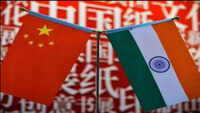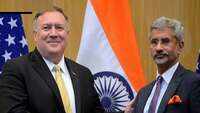
NEW DELHI: India on Thursday reiterated its insistence that “early and complete disengagement of Chinese troops along the Line of Actual Control”, as decided by their special representatives last month, is a prerequisite for smooth and overall development of bilateral relations.
Responding to questions, the MEA spokesperson said, “India remains committed to this objective. We also expect that the Chinese side will work with us sincerely for complete disengagement and deescalation and full restoration of peace and tranquillity in the border areas.”
As Chinese troops refuse to move back, particularly from the Pangong Tso and Depsang areas in east Ladakh, India’s insistence on a full disengagement puts the focus back on the kind of aggression China has been exhibiting in its neighbourhood.
Meanwhile, some reports indicated there may be some kind of a rethink among Beijing’s own hardliners about how China’s ‘wolf-warrior’ policies may be taking it towards greater isolation.
Richard McGregor, China scholar at Lowy Institute and author of ‘The Party’ and ‘Backlash’, says in an article in Nikkei Asian Review that while liberal scholars have been critical of President Xi Jinping’s assertive foreign policy, a couple of discordant voices from known hardliners and hawks in the Chinese military circles could signal a debate in the otherwise closed Chinese leadership circles.
McGregor writes that Colonel Zhou Bo, an occasional spokesperson for the CCP brass, writing in South China Morning Post in July, depicted the confrontation with US as mere “headwinds” to China’s “peaceful” development. “The most profound change the world is experiencing is China growing ever stronger,” he quoted Zhou as saying.
But he points to another article by Dai Xu, a PLA general and one of China’s most prominent hawks, titled ‘Four Unexpected Things and Ten New Understandings About the United States’. Dai advocates China taking stock of its relative weaknesses compared to US and behaving accordingly, he writes.
“China has provided assistance to so many countries, benefiting them in so many ways, but at this critical moment, none of them has taken any unified action with China,” Dai writes. Warning that China should never “knock on (America’s) door and make a loud announcement that ‘I shall surpass you, replace you and be the world’s number one’ ”, Dai seems to concede that China has gotten ahead of itself, McGregor writes.
But he also concedes that these dissonant notes may not make much of a difference in Xi’s thinking.
Responding to questions, the MEA spokesperson said, “India remains committed to this objective. We also expect that the Chinese side will work with us sincerely for complete disengagement and deescalation and full restoration of peace and tranquillity in the border areas.”
As Chinese troops refuse to move back, particularly from the Pangong Tso and Depsang areas in east Ladakh, India’s insistence on a full disengagement puts the focus back on the kind of aggression China has been exhibiting in its neighbourhood.
Meanwhile, some reports indicated there may be some kind of a rethink among Beijing’s own hardliners about how China’s ‘wolf-warrior’ policies may be taking it towards greater isolation.
Richard McGregor, China scholar at Lowy Institute and author of ‘The Party’ and ‘Backlash’, says in an article in Nikkei Asian Review that while liberal scholars have been critical of President Xi Jinping’s assertive foreign policy, a couple of discordant voices from known hardliners and hawks in the Chinese military circles could signal a debate in the otherwise closed Chinese leadership circles.
McGregor writes that Colonel Zhou Bo, an occasional spokesperson for the CCP brass, writing in South China Morning Post in July, depicted the confrontation with US as mere “headwinds” to China’s “peaceful” development. “The most profound change the world is experiencing is China growing ever stronger,” he quoted Zhou as saying.
But he points to another article by Dai Xu, a PLA general and one of China’s most prominent hawks, titled ‘Four Unexpected Things and Ten New Understandings About the United States’. Dai advocates China taking stock of its relative weaknesses compared to US and behaving accordingly, he writes.
“China has provided assistance to so many countries, benefiting them in so many ways, but at this critical moment, none of them has taken any unified action with China,” Dai writes. Warning that China should never “knock on (America’s) door and make a loud announcement that ‘I shall surpass you, replace you and be the world’s number one’ ”, Dai seems to concede that China has gotten ahead of itself, McGregor writes.
But he also concedes that these dissonant notes may not make much of a difference in Xi’s thinking.
Download
The Times of India News App for Latest India News

Coronavirus outbreak
Trending Topics
LATEST VIDEOS
India
 China tries raising Kashmir in UNSC, gets no support
China tries raising Kashmir in UNSC, gets no support  TOI Daily: RBI opens one-time window for companies, individuals to recast loans
TOI Daily: RBI opens one-time window for companies, individuals to recast loans  S Jaishankar, Mike Pompeo discuss ‘destabilizing actions’ in Ladakh in a phone call
S Jaishankar, Mike Pompeo discuss ‘destabilizing actions’ in Ladakh in a phone call  Covid-19: Hotspots shift to newer areas & states as cases rise
Covid-19: Hotspots shift to newer areas & states as cases rise  Centre appoints GC Murmu as new Comptroller and Auditor General
Centre appoints GC Murmu as new Comptroller and Auditor General  Covid-19 in India: Maharashtra, Andhra Pradesh continue to lead caseload
Covid-19 in India: Maharashtra, Andhra Pradesh continue to lead caseload
More from TOI
Navbharat Times
Featured Today in Travel
Quick Links
Coronavirus in MumbaiCoronavirus in KolkataCoronavirus in HyderabadCoronavirus in DelhiCoronavirus in BangaloreCoronavirus symptomsCoronavirus in IndiaWhat is CoronavirusCoronavirus NewsSolar EclipseNPRWhat is NRCCAB BillCAB and NRCRTI BillPodcast newsLok SabhaShiv SenaYSRCPCongressBJP newsUIDAIIndian ArmyISRO newsSupreme Court
Get the app



